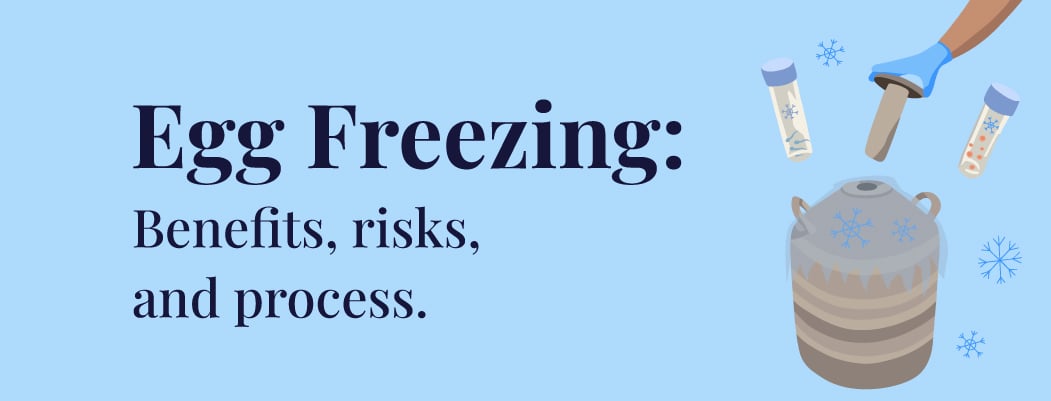What is egg freezing?
March 6, 2023

What is egg freezing?
Egg freezing, also known as oocyte cryopreservation, is a medical procedure where a woman’s eggs are harvested, frozen, and stored for later use. It is a fertility preservation technique that allows women to delay childbirth until they are ready or when they face medical conditions that could affect their fertility.
The egg-freezing process involves stimulating the ovaries with hormones to produce multiple eggs. These eggs are then retrieved through a minor surgical procedure called follicular aspiration. The eggs are then flash-frozen using vitrification, which preserves them by quickly freezing them to prevent ice crystal formation. The frozen eggs are then stored in a cryogenic freezer at -196 degrees Celsius until needed.
Contents
Egg freezing has gained popularity in recent years due to technological advances, changes in social attitudes towards motherhood and career choices, and the increasing age at which women have children. According to the American Society for Reproductive Medicine (ASRM), egg freezing is no longer considered experimental and is a widely accepted method of fertility preservation.
Who Can Benefit from Egg Freezing?
Egg freezing is an option for women who want to delay childbirth until they are ready or when they face medical conditions that could affect their fertility. Some reasons women may choose to freeze their eggs include the following.
- Medical Reasons: Women who need to undergo chemotherapy or radiation therapy for cancer or other medical conditions may choose to freeze their eggs before the treatment begins. These treatments can damage the ovaries and reduce fertility, making it difficult or impossible to conceive naturally in the future.
- Social Reasons: Women who are not yet ready to start a family but want to ensure their ability to have children later in life may choose to freeze their eggs. This includes women who want to focus on their careers, education, travel, or wait for the right partner.
- Age-related Infertility: As women age, the quality and quantity of their eggs decrease, leading to a decline in fertility. Egg freezing allows women to preserve their fertility when they are younger and have a higher chance of producing healthy eggs.
- LGBTQ+ Couples: Egg freezing is also an option for LGBTQ+ couples wanting a biological child. Women in same-sex relationships or transgender men can use frozen eggs to conceive with the help of a sperm donor.
What is the Success Rate of Egg Freezing?
The success rate of egg freezing depends on various factors, including the woman’s age when the eggs were frozen, the quality of the eggs, and the number of eggs retrieved. According to the ASRM, the chance of a frozen egg resulting in a live birth ranges from 2% to 12% per egg, depending on the woman’s age when the eggs were frozen.
The best time to freeze eggs is before the age of 35, as the quality and quantity of eggs decline after this age. Women who freeze their eggs before the age of 35 have a higher chance of success than those who freeze their eggs at an older age.
What are the Risks and Side Effects of Egg Freezing?
Egg freezing is generally considered safe and does not cause any long-term health risks. However, like any medical procedure, there are some risks and side effects associated with egg freezing. These include:
- Ovarian Hyperstimulation Syndrome (OHSS): The hormones used to stimulate the ovaries can cause OHSS, a condition where the ovaries become swollen and painful. In rare cases, OHSS can lead to more serious complications such as blood clots, kidney failure, and respiratory distress.
- Multiple Pregnancy: Using multiple eggs during IVF treatment can increase the chance of multiple pregnancies, which can be risky for both the mother and the babies.
- Emotional and Psychological Effects: Egg freezing can be emotionally and psychologically challenging. It can cause stress, anxiety, and depression in some women, especially if they face unexpected challenges or have difficulty conceiving later on.
- Cost: Egg freezing can be expensive and may not be covered by insurance. Women may also need to pay for storage fees and fertility treatments later.
Despite these risks and challenges, many women find egg freezing a valuable option for preserving their fertility and having the option to conceive later in life.
The process involved in egg-freezing
The egg-freezing process involves several steps, including ovarian stimulation and monitoring, egg retrieval, and egg freezing.
-
Ovarian Stimulation and Monitoring
The first step in the egg-freezing process is ovarian stimulation. First, the woman is given hormones to stimulate the ovaries to produce multiple eggs. This is done using injections of follicle-stimulating hormone (FSH) and luteinising hormone (LH) over a period of about two weeks.
During this time, the woman’s response to the hormones is monitored closely through blood tests and ultrasounds to ensure that the ovaries produce multiple mature eggs. The dosage of hormones may be adjusted based on the woman’s response to the treatment.
-
Egg Retrieval
Once the eggs have reached the appropriate size and maturity, the woman undergoes an egg retrieval procedure. This is a minor surgical procedure performed under sedation or general anesthesia.
During the procedure, a small ultrasound-guided needle is inserted through the vagina and into each ovary to retrieve the eggs. The eggs are collected in a test tube and immediately placed into a sterile container for transport to the laboratory.
-
Egg Freezing
The collected eggs are then frozen using a process called vitrification. This involves quickly freezing the eggs to prevent ice crystal formation, which could damage the eggs. The eggs are placed in a special solution and stored in a cryogenic freezer at a temperature of -196 degrees Celsius until needed.
The egg-freezing process typically takes about two to three weeks, from the start of ovarian stimulation to the completion of egg retrieval and freezing.
Risks and Side Effects of the Egg Freezing Process
The egg-freezing process is generally considered safe but has some risks and side effects. These include:
- Ovarian Hyperstimulation Syndrome (OHSS): The hormones used for ovarian stimulation can cause OHSS, a condition where the ovaries become swollen and painful. In rare cases, OHSS can lead to more serious complications such as blood clots, kidney failure, and respiratory distress.
- Infection: There is a small risk of infection associated with the egg retrieval procedure.
- Bleeding: Some women may experience mild bleeding or spotting after the egg retrieval procedure.
- Emotional and Psychological Effects: Egg freezing can be emotionally and psychologically challenging. It can cause stress, anxiety, and depression in some women, especially if they face unexpected challenges or have difficulty conceiving later on.
Who to consult for egg freezing?
Fertility specialists, known as reproductive endocrinologists, have substantial specialty training in the field of fertility and assisted reproductive technologies like egg freezing and in vitro fertilization.
People also ask:
-
What is the egg-freezing process?
The egg freezing process, also known as oocyte cryopreservation, involves several steps. First, a woman undergoes ovarian stimulation, where she is given hormones to stimulate the ovaries to produce multiple eggs. Then, the eggs are retrieved using a minor surgical procedure and frozen using a process called vitrification, which involves quickly freezing the eggs to prevent ice crystal formation. The frozen eggs are stored in a cryogenic freezer until they are needed. The entire process typically takes about two to three weeks.
-
What is the best age to freeze your eggs?
There is no one “best” age to freeze your eggs, as it depends on individual circumstances. However, women are generally advised to freeze their eggs before the age of 35, as the quality and quantity of a woman’s eggs start to decline after that age. Women who are at risk of premature ovarian failure or have a medical condition that could affect their fertility may want to consider egg freezing at an earlier age.
-
What are the benefits of freezing eggs?
- Preserving fertility: Egg freezing allows women to preserve their fertility and have the option to conceive later in life.
- Delaying childbirth: Egg freezing can help women delay childbirth until they are ready, such as to pursue career or educational goals.
- Providing peace of mind: For women who are at risk of premature ovarian failure or have a medical condition that could affect their fertility, egg freezing can provide peace of mind and reduce stress and anxiety.
-
What are the risks of freezing eggs?
The risks of freezing eggs include ovarian hyperstimulation syndrome, infection, bleeding, and emotional and psychological effects such as stress, anxiety, and depression.








